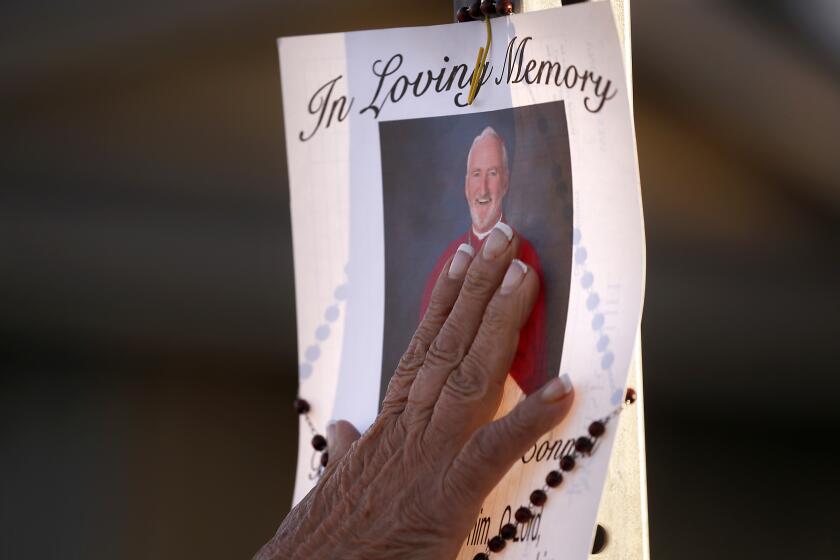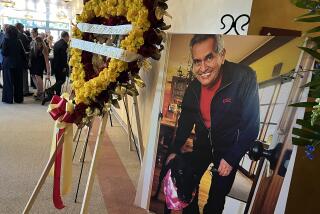Column: ‘He brought us in closer’: The L.A. journey of Bishop O’Connell
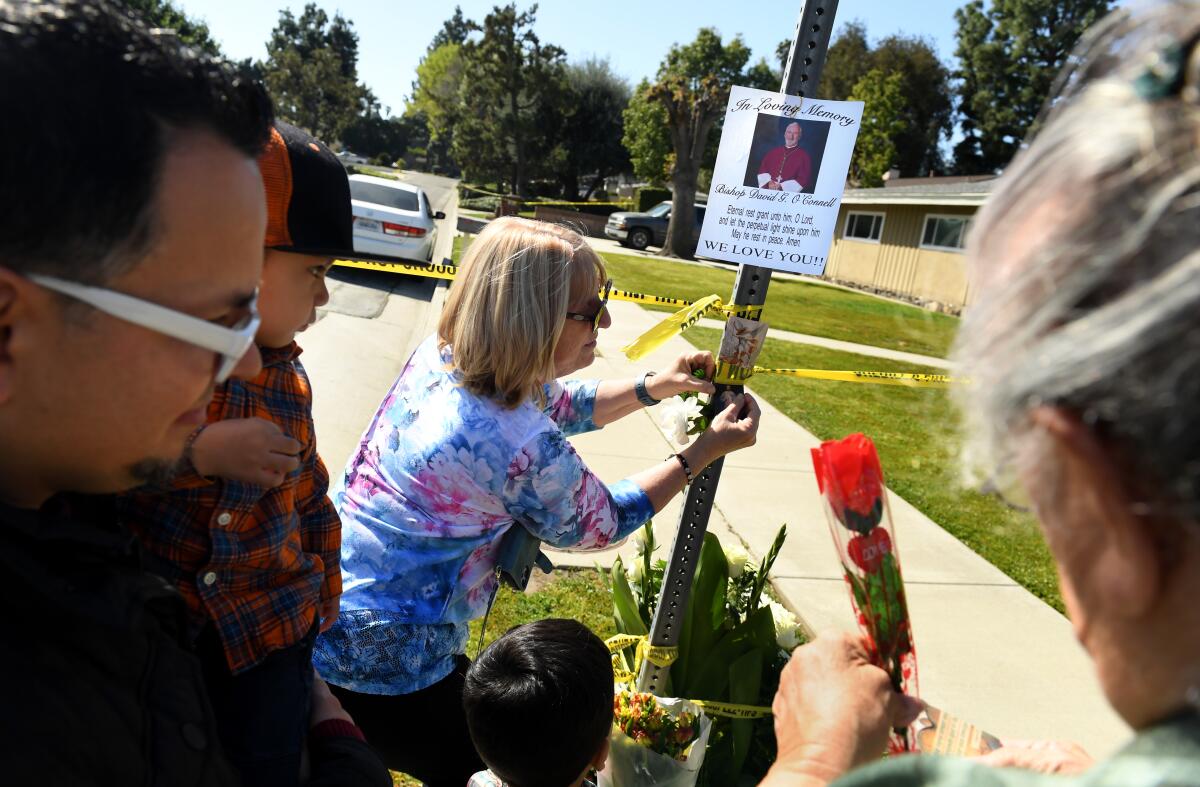
- Share via
The sun rose over St. Raymond Church in Downey on Ash Wednesday as parishioners filed in for Mass. It was four days after Los Angeles Bishop David G. O’Connell was found dead at his Hacienda Heights home from five gunshot wounds.
Catholics around Southern California and the world mourned the loss of a man Archbishop José H. Gómez described in an emotional press conference as a “man of peace.”
Over a 43-year career across Los Angeles County, the Spanish-speaking Irish immigrant stood up for his working class parishioners against federal and local officials and even his own bosses. Even after Pope Francis appointed him as a bishop in 2015, O’Connell never lost his common touch.
The motive for the killing remains unclear. A handyman whose wife worked as the bishop’s housekeeper has been charged with one count of murder.
On Ash Wednesday, I visited some of the stations of O’Connell’s L.A. journey to answer this: How did he come to embody the best L.A. can be?
St. Raymond was where O’Connell, who was 69 when he died, started his career in 1979 as an associate pastor. No markers commemorated O’Connell’s four years here, and Father Justin Ordoveza didn’t mention his superior’s name during Mass. On the other hand, he didn’t have to.
The Gospel that morning was from the Book of Matthew, where Jesus tells his disciples not to boast about their good deeds. Though O’Connell earned a lot of positive press, I’d soon find out it was the small moments that his former parishioners treasured the most.
Twenty years ago, I went to tell the story of a priest coping with revelations of sexual abuse in the Catholic Church. I found a man dedicated to service.
After Mass, I walked into the sacristy to talk with Robert and Madeline Buckley, who have attended St. Raymond since 1967.
“We remember him when he was fresh off the boat,” cracked Madeline. “Looked like a big Irish kid. Learned everyone’s name almost immediately.”
She told me about the Ash Wednesday when O’Connell, needing to unwind after a day’s worth of services, invited her and Robert to a nearby pub along with another Irish priest. “We had a wonderful time,” she said, her grin revealing nothing else.
Robert, who handed out the Eucharist and marked ash crosses on the foreheads of his fellow parishioners, once gifted O’Connell a toy train set for Christmas after the young priest said his family was never able to buy him one.
“But then he gave it to a young boy, because that’s the type of man he was,” Robert said. “He seemed to sense the sorrows people kept, and cared to them.”
“We were so happy when he joined the hierarchy,” Madeline added. “He could’ve become a cardinal.”
O’Connell moved on to assist parishes in Pico Rivera and Long Beach until heading his own in 1988 — St. Frances X. Cabrini in West Athens. He would minister from there and other South L.A. churches for the next 27 years.
The charismatic priest organized against gun violence and environmental racism with other neighborhood groups and helped South L.A. rebuild after the 1992 riots. He shepherded St. Frances X. Cabrini as it transitioned from a historically Black parish to a mostly Latino one.
This past and present were on display at Cabrini’s Ash Wednesday morning Mass. Bright African textiles were wrapped around the altar and lectern. Shrines hosted statues of El Divino Salvador del Mundo and El Cristo Negro de Esquipulas — images of Jesus revered respectively in El Salvador and Guatemala and their diasporas.
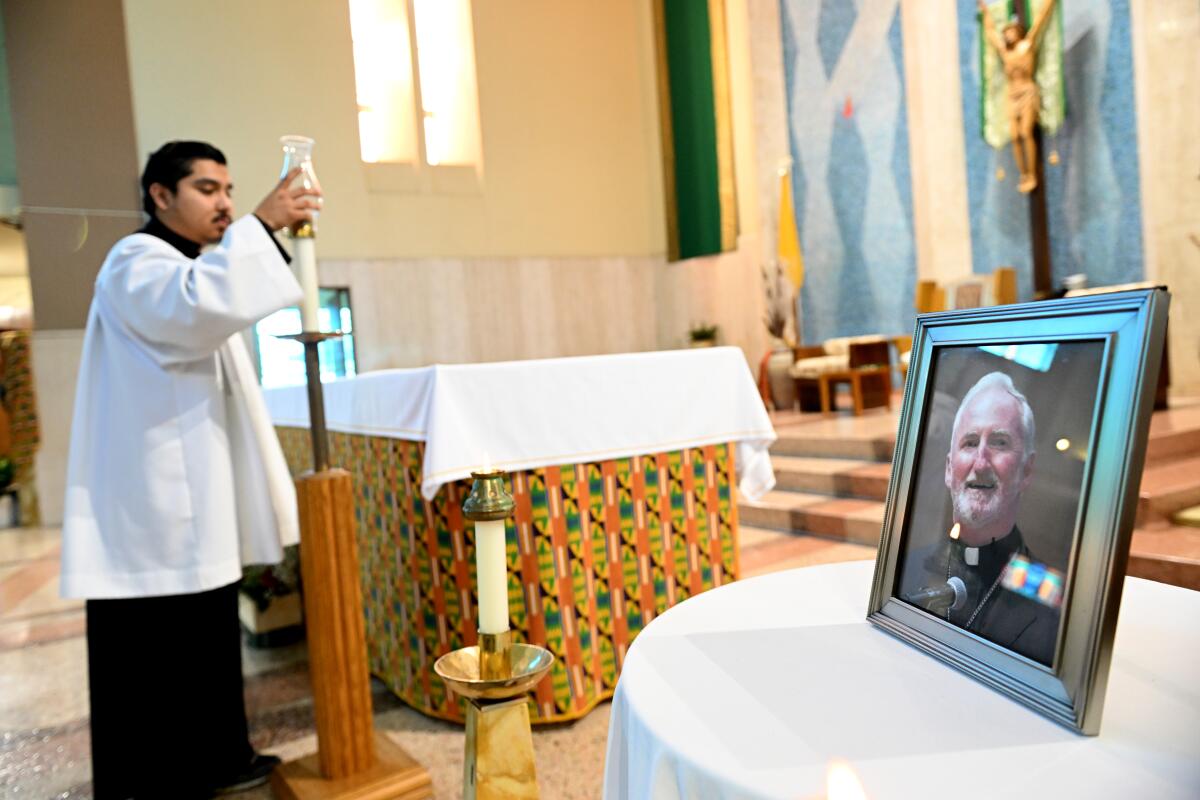
The future packed the front pews: the Black and Latino student body from the church’s school. They performed in the worship band, served as lectors and ushered people during the ash ceremony.
Father Juan Bosco invoked O’Connell’s name multiple times. He prayed that the bishop may “intercede for us, his beloved community” from heaven. He reminded everyone that one of O’Connell’s favorite causes was fundraising for working class children to attend Catholic schools. And Bosco concluded Mass by announcing that O’Connell’s memorial service would be March 4.
“Wherever he went, he helped the poor,” said Patrick Aririguzo, who was there with his wife, Pauline. “Everyone is shedding tears.”
Araceli Ortega attended Ascension Church a mile away when O’Connell ministered there for a couple of years, but her fondest memories were more recent. Her daughter attends St. Frances X. Cabrini School, and O’Connell frequently visited to check in on students, long after he had left the parish.
“He was the type of person that he would take out the bread from his mouth and give it to whoever was hungry,” Ortega said. “To me, he was an angel.”
After Mass, I traveled up to Santa Monica, to a place I would’ve never pegged as significant to O’Connell: The Lowes Santa Monica Beach Hotel. Its view of the Pacific and its hoity toity clientele were miles removed from South L.A., geographically and spiritually.
As I sat at a marble table for one, the waiter took my order for a breakfast burrito. That’s when I noticed the Unite Here Local 11 pin on his shirt.
In the late 1990s, labor organizers engaged in “a really bitter fight” to unionize the hotel’s workers, according to Unite Here organizing director Noel Rodriguez. O’Connell had already involved himself in workers rights issues across Los Angeles. He served as a bridge between the management of Catholic hospitals in Lynwood and employees during a labor dispute. In 1999, he read the story of David and Goliath during a rally at USC in which 25 protesters were arrested.
“I asked Bishop Dave to talk to this [Lowe’s] cook, because he was scared” to join the union, Rodriguez said in a phone interview. Some weeks went by, and Rodriguez reminded O’Connell of his promise.
“He told me, ‘I haven’t done it,’ got right in his car and visited [the cook] at his home. He helped him overcome his fear,” Rodriguez recalled. “The cook joined the union and got others to join. That kind of stuff happened all the time.”
O’Connell became a “fixture” at labor and immigrant rights rallies in the years that followed, Rodriguez said. He still stands in awe of O’Connell’s organizing prowess, especially his push to get community members to stand up for themselves and not rely on big-name leaders like him. His main tool was small home gatherings where attendees read the Bible, then talked about how to improve their neighborhoods and lives.
“They would reflect on the Gospel, and O’Connell would remind them who Jesus was,” Rodriguez said. “He was poor, he was a migrant, he was a worker.”
Rodriguez choked up.
“Workers stood up and fought, and O’Connell inspired them to stand up and fight.”
The killing of Los Angeles Bishop David G. O’Connell brings disbelief and mourning.
After scarfing down my breakfast burrito and chasing it with a shot of Jameson to toast this Irish cleric who enjoyed a drink or two, I traveled to Irwindale, headquarters for the San Gabriel Pastoral Region of the L.A. archdiocese. This became O’Connell’s office when Pope Francis appointed him as an auxiliary bishop in 2015. Instead of overseeing a couple of parishes in South L.A., O’Connell now was in charge of 66.
Many were surprised at his ascension, especially O’Connell. He never shied away from criticizing his own bosses, calling for priests to be allowed to marry and for more power for laypeople to hold priests and bishops accountable for their misdeeds. When then-Cardinal Roger Mahony cut budgets for the archdiocese’s ministries for prisons, LGBTQ and interreligious affairs in 2002, O’Connell told The Times, “We just think that decision went against our values as to what we’re supposed to stand for as a church.”
A St. Patrick’s Day decoration hung on the other side of the beveled glass door as I buzzed the receptionist. She said no one was available to talk, so I walked next door to Our Lady of Guadalupe Church.
Near the entrance, West Covina residents Laura Montalvo and Evangelina Lopez sold large wax candles to parishioners who were leaving noontime Mass.
“Usually, the bishops are very hierarchical — you can’t get near them,” Montalvo said. “But [O’Connell] brought us in closer.”
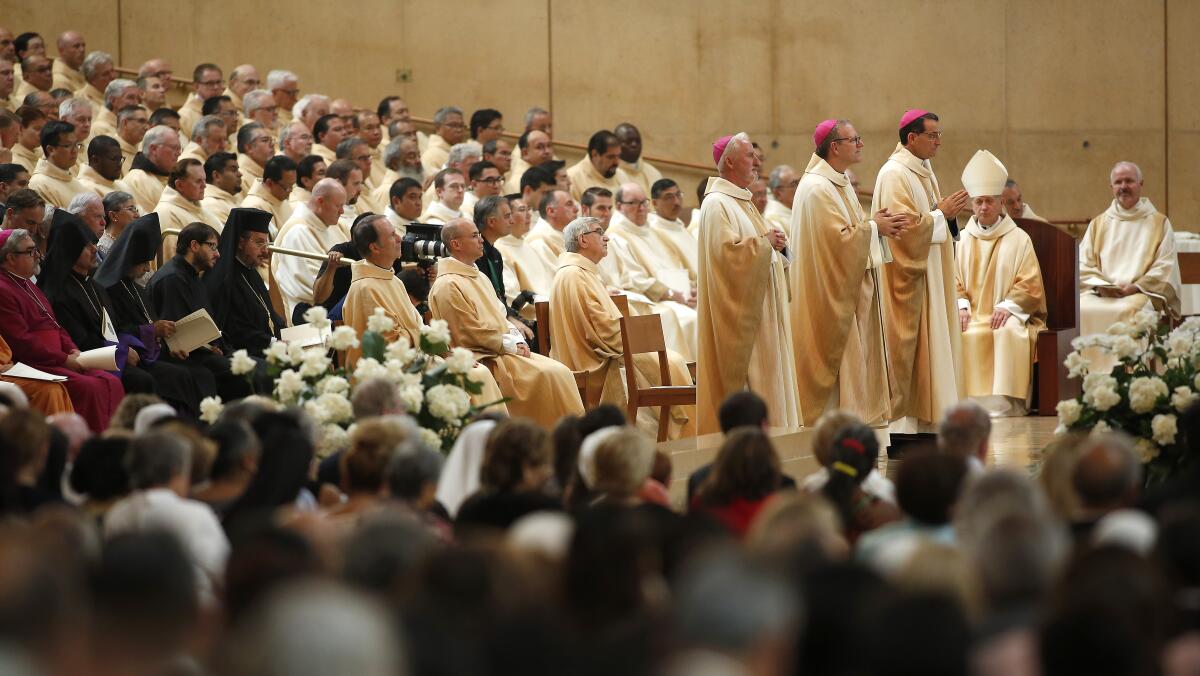
Lopez remembered how O’Connell prayed the rosary during protests at abortion clinics and offered Mass throughout the pandemic from the spot where they stood, looking outward to the church parking lot where the faithful sat six feet apart. “He always took care of us,” she said. “He transmitted peace.”
Did he speak perfect Spanish, I asked? The two women looked at each other.
“Perfect?” Montalvo replied. “Well, he spoke it good!”
My final stop was all the way across town, at an Embassy Suites on the south side of LAX. I sat in bad traffic for over an hour. O’Connell had weathered the same drive just three weeks earlier to attend a training seminar hosted by One LA-IAF, the populist community group for which he was a longtime leader.
“He had a very fierce passion for justice, for the dignity of people,” said lead organizer Robert Hoo, who had known him since 2005. He invited O’Connell to stop by and listen to a lecture by Pope Francis’ biographer.
“Bishop Dave got there at 9:30 and stayed all the way until 2 o’ clock,” Hoo said. “People were hugging and embracing him, and he was thrilled to see them — it had been a little while for everyone.
“He said, ‘I’ve got to come to more of these things. These are the things that energize me,’” Hoo added.
I walked around the Embassy Suites and saw tired conference rooms next to an indoor koi pond. Even in a drab place like this, O’Connell still bore witness.
Hoo sent me two video clips that encapsulated the O’Connell so many people loved. One was from a 2017 One LA-IAF training where the bishop, an amateur stand-up comic, offered “a classic Dave joke” — something about a chicken and a pig passing by a church bacon-and-egg breakfast.
He repeated it in Spanish, his Irish brogue still as thick as a pint of Guinness. The audience applauded wildly.
The other clip was from a Zoom meeting last month, where O’Connell greeted IAF members who had recently met with Pope Francis about their organizing efforts. In it, the bishop stood in his office and beamed.
“God bless you for all you’re doing,” he said. “You’re our best hope — not just for your own communities, but for the church and our society. For America, right now.”
More to Read
Sign up for Essential California
The most important California stories and recommendations in your inbox every morning.
You may occasionally receive promotional content from the Los Angeles Times.
